Viktor de Kowa (1904-1973) was a German actor, singer, director and comedy writer. In the 1930s he became one of the most prominent and beloved comedy actors of the German cinema.
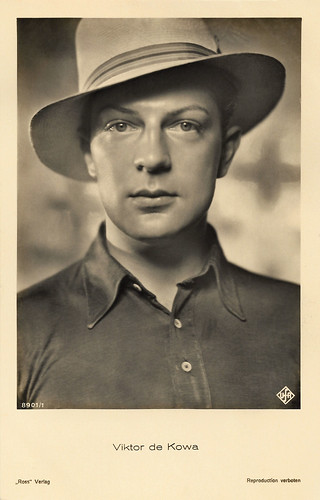
German postcard by Ross Verlag, no. 8909/1, 1933-1934. Photo: Ufa.
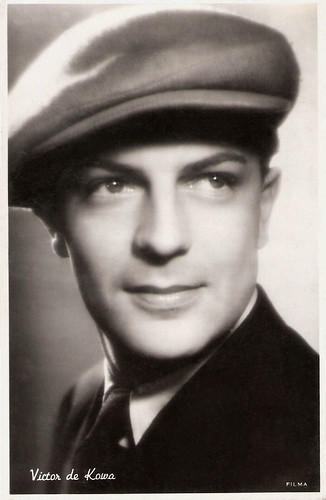
Dutch postcard by M.B. & Z. (M. Bonnist & Zonen), no. 1221. Photo: Filma.

German postcard by Ross Verlag, no. 3382/1, 1928-1929. Photo: Tita Binz / Tobis.
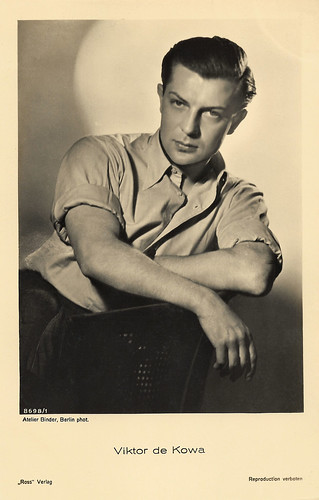
German postcard by Ross Verlag, no. 8698/1, 1933-1934. Photo: Atelier Binder, Berlin.
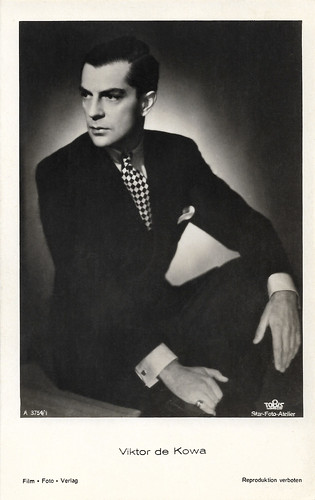
German postcard by Film-Foto-Verlag, no. A 3754/1, 1941-1944. Photo: Star-Foto-Atelier / Tobis.
Viktor (sometimes Victor) de Kowa was born as Viktor Paul Karl Kowarzik (some sources write Kowal(l)czyk) in 1904 in the village Hochkirch (nowadays Przesieczany), Germany (now south-western Poland, close to the German border).
He was educated at the Art Academy in Dresden and started his career as a poster and fashion drawer. Soon he abandoned this job and took acting lessons from the famous actor Erich Ponto. He debuted in 1922 at the Dresdner Staatstheater and also worked in Lübeck, Frankfurt am Main and Hamburg before he went to Berlin. There he was engaged at the Volksbühne, the Deutsches Theater and from 1935 at the Staatstheater.
He made his cinema debut with the silent film Der Herzensdieb/The Heart Thief (Nils Olaf Chrisander, 1927) starring Joseph Schildkraut and Lya de Putti. Two years later he had a supporting part in the circus film Katharina Knie (Karl Grune, 1929) featuring Carmen Boni. After the introduction of the sound film, he became a darling of the female public with his very individual romantic roles.
He took part in such films as the comedy Pension Schöller (Georg Jacoby, 1930), the war drama Die andere Seite/The Other Side (Heinz Paul, 1931) with Conrad Veidt, the comedy Der Stolz der 3. Kompanie/The Pride of the Third Company (Fred Sauer, 1932), the Horror comedy Unheimliche Geschichten/Unholy Tales (Richard Oswald, 1932) with Paul Wegener, and the romantic drama Ein Lied geht um die Welt/The Joseph Schmidt Story (Richard Oswald, 1933).
Viktor de Kowa had his great breakthrough with the post-war drama Kleiner Mann - was nun?/Little Man What Now (Fritz Wendhausen, 1933), based on the novel by Hans Fallada.

German postcard by Ross Verlag, no. 7720/1, 1932-1933. Photo: Hisa-Film-Vertrieb GmbH. Viktor de Kowa in Sag' mir, wer Du bist/Tell Me Who You Are (Georg Jacoby, 1933).
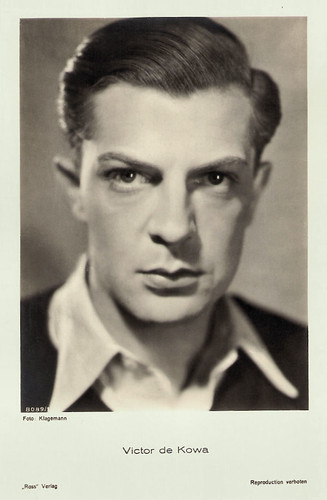
German postcard by Ross Verlag, no. 8089/1, 1933-1934. Photo: Klagemann.

German postcard by Ross Verlag, no. 8088/1. Photo: Hisa-Film-Vertrieb G.m.b.H. Charlotte Ander and Viktor de Kowa in Zwei im Sonnenschein/Two in the Sunshine (Georg Jacoby, 1933).
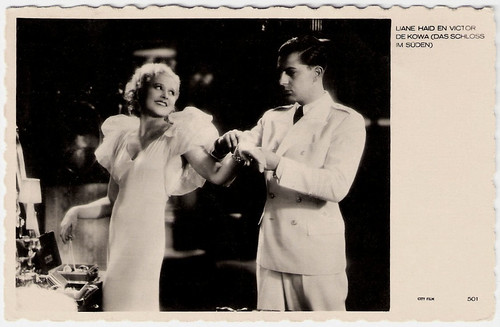
Dutch postcard by City Film, no. 501. Photo: publicity still for Das Schloß im Süden/The Castle in the South (Géza von Bolváry, 1933) with Liane Haid.
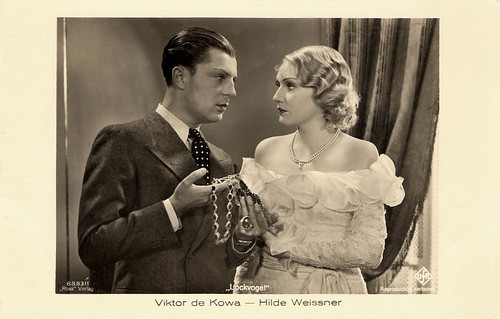
German postcard by Ross Verlag, no. 8883/1, 1933-1934. Photo: Ufa. Publicity still for Lockvogel/Decoy (Hans Steinhoff, 1934) with Hilde Weissner.
In the following years, Viktor de Kowa became a star with comedies like Die Finanzen des Grossherzogs/The Grand Duke's Finances (Gustaf Gründgens, 1934) opposite Hilde Weissner, Der junge Baron Neuhaus/The Young Baron Neuhaus (Gustav Ucicky, 1934) with Käthe von Nagy, Die grosse und die kleine Welt/The Big and the Small World (Johannes Riemann, 1936), and Die göttliche Jette/The Divine Jetta (Erich Waschneck, 1937) with Grethe Weiser.
During the war years, he starred in Wir machen Musik/We Make Music (Helmut Käutner, 1942) co-starring Ilse Werner, and the crime comedy Peter Voss, der Millionendieb/Peter Voss - The Million Thief (Karl Anton, 1943-1946).
In those years he also directed three films - Schneider Wibbel/Tailor Wibbel (1939) starring Erich Ponto, Casanova heiratet/Casanova Marries (1940) and Kopf hoch, Johannes/Head Up, Johannes (1941) starring Albrecht Schoenhals and Dorothea Wieck.
He continued his acting during the war. He was a member of the NSDAP and directed the Nazi propaganda film Kopf Hoch, Johannes/Head high, Johannes. In this Nazi youth film, the independent, freedom-loving boy Johannes is converted in a Nazi youth organization, a Napola school, to discipline and obedience. This subject made De Kowa euphoric: "The task to create an image from the life of this young generation, these future leaders of Greater Germany - this is a work about which one can be enthusiastic honestly and without reservations."
Although Joseph Goebbels called the subject of the film 'well', he was disappointed by the direction of De Kowa. Nevertheless, Goebbels placed De Kowa in August 1944 on the 'Gottbegnadeten-Liste' (god-gifted list of the indispensable actors) which retained him from a war application, and from the Heimatfront.
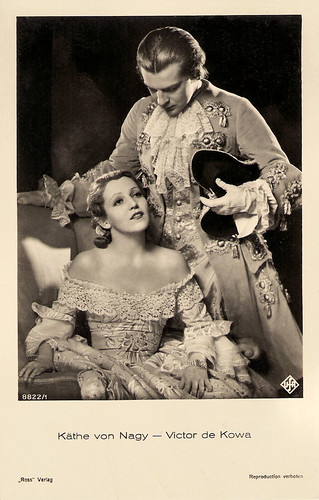
German postcard by Ross Verlag, no. 8822/1, 1933-1934. Photo: Ufa. Publicity still for Der junge Baron Neuhaus/The Young Baron Neuhaus (Gustav Ucicky, 1934) with Käthe von Nagy.
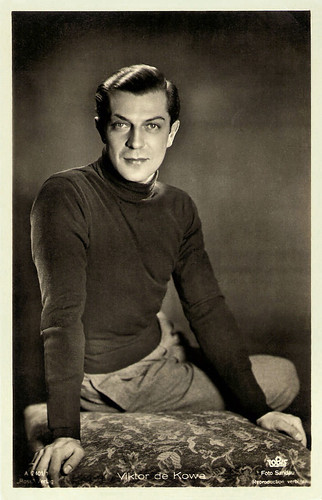
German postcard by Ross Verlag, no. A 2401/1, 1939-1940. Photo: Tobis / Sandau.
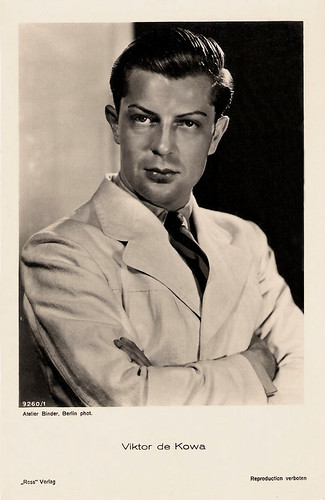
German postcard by Ross Verlag, no. 9260, 1935-1936. Photo: Atelier Binder, Berlin.
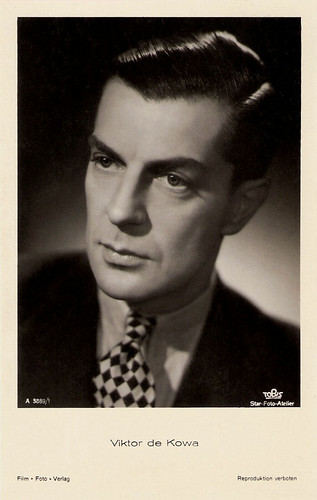
German postcard by Film-Foto-Verlag, no. A 3889/1, 1941-1944. Photo: Tobis / Star-Foto-Atelier.
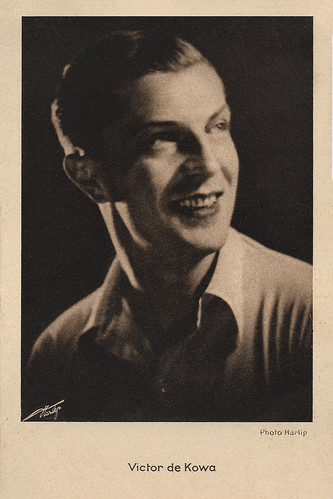
German postcard by Das Programm von Heute / Ross Verlag, Berlin. Photo: Harlip.
After the war, Viktor de Kowa immediately received a working permit and he became the manager of the Berliner Tribüne till 1950. From 1956 to 1962 he was a member of the Burgtheater in Vienna. As chairman of the trade unions for art, culture and media, he was also a board director of the Confederation of German Trade Unions (DGB).
He was also active in the post-war film, produced some films and wrote plays. To his well-known films after the war belong Zwischen gestern und morgen/Between Yesterday and Tomorrow (Harald Braun, 1947) starring Hildegard Knef, Anonyme Briefe/Anonymous Letters (Arthur Maria Rabenalt, 1949) with Käthe Haack.
During the 1950s, such films followed as Des Teufels General/The Devil's General (Helmut Käutner, 1955) opposite Curd Jürgens, Ein Mädchen aus Flandern/The Girl from Flanders (Helmut Käutner, 1955) with Maximilian Schell, Scampolo (Alfred Weidenmann, 1957) starring Romy Schneider, and Der veruntreute Himmel/Embezzled Heaven (Ernst Marischka, 1958), based on a novel by Franz Werfel.
From the 1960s on, Viktor de Kowa worked for the cinema as well as for television. To his last films belong the Edgar Wallace mystery Der Fälscher von London/The Forger of London (Harald Reinl, 1961), the thriller Es muss nicht immer Kaviar sein/Operation Caviar (Géza von Radványi, 1961) with O.W. Fischer, and the comedy Das Haus in Montevideo/The House in Montevideo (1963, Helmut Käutner) with Heinz Rühmann. His last film part was Ravenhurst in Winnetou und sein Freund Old Firehand/Thunder at the Border (Alfred Vohrer, 1966) with Rod Cameron and Pierre Brice.
Viktor de Kowa was married twice. In 1926 he married the actress Ursula Grabley. After their divorce, he married in 1941 the Japanese actress and singer Michiko Tanaka. He died of cancer in 1973 in Berlin. He was 66.

German cigarette card by Ross Verlag in the 'Künstler im Film' series for Zigarettenfabrik Monopol, Dresden, Serie 1, image 133 (of 200). Photo: Binder, Berlin.
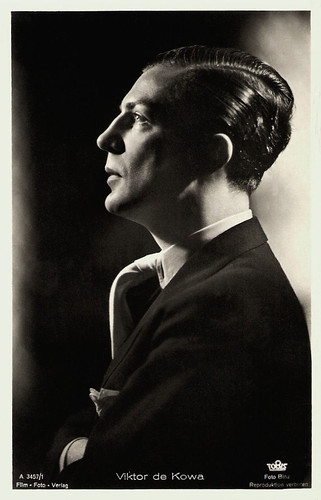
German postcard by Film-Foto-Verlag, no. 3457/1, 1941-1944. Photo: Tobis / Tita Binz.
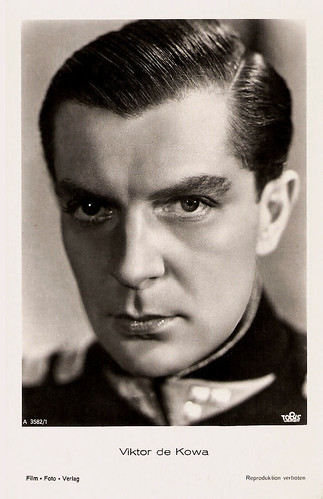
German postcard by Film-Foto-Verlag, no. A 3582/1, 1941-1944. Photo: Tobis.
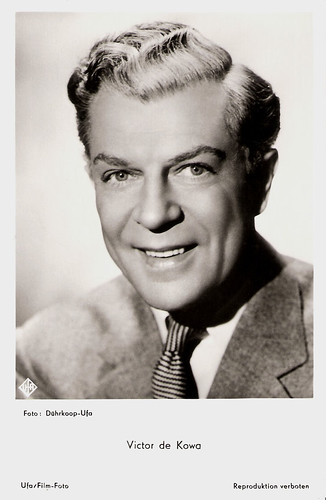
German postcard by Ufa/Film-Foto, no. FK 3081. Photo: Dührkoop / Ufa.

Dutch postcard by Gebr. Spanjersberg N.V., Rotterdam, no. 1100. Photo: Universum-Film Aktiengesellschaft (UFA), Berlin-Tempelhof. Romy Schneider, Eva Maria Meinecke, Paul Hubschmidt, Georg Thomalla, and Viktor de Kowa in Scampolo (Alfred Weidenmann, Rhombus Film 1958), distributed by UFA.
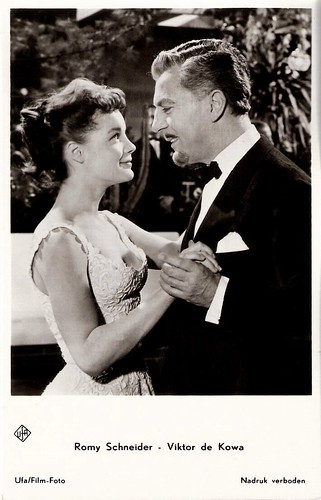
Dutch postcard by Gebr. Spanjersberg N.V., Rotterdam, no. 1108. Photo: Ufa (Universum-Film Aktien-gesellschaft, Berlin-Tempelhof). Publicity still for Scampolo (Alfred Weidenmann, 1958) with Romy Schneider.
Sources: Thomas Staedeli (Cyranos), The Androom Archives, Wikipedia (German), and IMDb.
This post was last updated on 9 January 2025.

German postcard by Ross Verlag, no. 8909/1, 1933-1934. Photo: Ufa.

Dutch postcard by M.B. & Z. (M. Bonnist & Zonen), no. 1221. Photo: Filma.

German postcard by Ross Verlag, no. 3382/1, 1928-1929. Photo: Tita Binz / Tobis.

German postcard by Ross Verlag, no. 8698/1, 1933-1934. Photo: Atelier Binder, Berlin.

German postcard by Film-Foto-Verlag, no. A 3754/1, 1941-1944. Photo: Star-Foto-Atelier / Tobis.
A darling of the female public
Viktor (sometimes Victor) de Kowa was born as Viktor Paul Karl Kowarzik (some sources write Kowal(l)czyk) in 1904 in the village Hochkirch (nowadays Przesieczany), Germany (now south-western Poland, close to the German border).
He was educated at the Art Academy in Dresden and started his career as a poster and fashion drawer. Soon he abandoned this job and took acting lessons from the famous actor Erich Ponto. He debuted in 1922 at the Dresdner Staatstheater and also worked in Lübeck, Frankfurt am Main and Hamburg before he went to Berlin. There he was engaged at the Volksbühne, the Deutsches Theater and from 1935 at the Staatstheater.
He made his cinema debut with the silent film Der Herzensdieb/The Heart Thief (Nils Olaf Chrisander, 1927) starring Joseph Schildkraut and Lya de Putti. Two years later he had a supporting part in the circus film Katharina Knie (Karl Grune, 1929) featuring Carmen Boni. After the introduction of the sound film, he became a darling of the female public with his very individual romantic roles.
He took part in such films as the comedy Pension Schöller (Georg Jacoby, 1930), the war drama Die andere Seite/The Other Side (Heinz Paul, 1931) with Conrad Veidt, the comedy Der Stolz der 3. Kompanie/The Pride of the Third Company (Fred Sauer, 1932), the Horror comedy Unheimliche Geschichten/Unholy Tales (Richard Oswald, 1932) with Paul Wegener, and the romantic drama Ein Lied geht um die Welt/The Joseph Schmidt Story (Richard Oswald, 1933).
Viktor de Kowa had his great breakthrough with the post-war drama Kleiner Mann - was nun?/Little Man What Now (Fritz Wendhausen, 1933), based on the novel by Hans Fallada.

German postcard by Ross Verlag, no. 7720/1, 1932-1933. Photo: Hisa-Film-Vertrieb GmbH. Viktor de Kowa in Sag' mir, wer Du bist/Tell Me Who You Are (Georg Jacoby, 1933).

German postcard by Ross Verlag, no. 8089/1, 1933-1934. Photo: Klagemann.

German postcard by Ross Verlag, no. 8088/1. Photo: Hisa-Film-Vertrieb G.m.b.H. Charlotte Ander and Viktor de Kowa in Zwei im Sonnenschein/Two in the Sunshine (Georg Jacoby, 1933).

Dutch postcard by City Film, no. 501. Photo: publicity still for Das Schloß im Süden/The Castle in the South (Géza von Bolváry, 1933) with Liane Haid.

German postcard by Ross Verlag, no. 8883/1, 1933-1934. Photo: Ufa. Publicity still for Lockvogel/Decoy (Hans Steinhoff, 1934) with Hilde Weissner.
Pacifist or God-gifted NSDAP actor?
In the following years, Viktor de Kowa became a star with comedies like Die Finanzen des Grossherzogs/The Grand Duke's Finances (Gustaf Gründgens, 1934) opposite Hilde Weissner, Der junge Baron Neuhaus/The Young Baron Neuhaus (Gustav Ucicky, 1934) with Käthe von Nagy, Die grosse und die kleine Welt/The Big and the Small World (Johannes Riemann, 1936), and Die göttliche Jette/The Divine Jetta (Erich Waschneck, 1937) with Grethe Weiser.
During the war years, he starred in Wir machen Musik/We Make Music (Helmut Käutner, 1942) co-starring Ilse Werner, and the crime comedy Peter Voss, der Millionendieb/Peter Voss - The Million Thief (Karl Anton, 1943-1946).
In those years he also directed three films - Schneider Wibbel/Tailor Wibbel (1939) starring Erich Ponto, Casanova heiratet/Casanova Marries (1940) and Kopf hoch, Johannes/Head Up, Johannes (1941) starring Albrecht Schoenhals and Dorothea Wieck.
He continued his acting during the war. He was a member of the NSDAP and directed the Nazi propaganda film Kopf Hoch, Johannes/Head high, Johannes. In this Nazi youth film, the independent, freedom-loving boy Johannes is converted in a Nazi youth organization, a Napola school, to discipline and obedience. This subject made De Kowa euphoric: "The task to create an image from the life of this young generation, these future leaders of Greater Germany - this is a work about which one can be enthusiastic honestly and without reservations."
Although Joseph Goebbels called the subject of the film 'well', he was disappointed by the direction of De Kowa. Nevertheless, Goebbels placed De Kowa in August 1944 on the 'Gottbegnadeten-Liste' (god-gifted list of the indispensable actors) which retained him from a war application, and from the Heimatfront.

German postcard by Ross Verlag, no. 8822/1, 1933-1934. Photo: Ufa. Publicity still for Der junge Baron Neuhaus/The Young Baron Neuhaus (Gustav Ucicky, 1934) with Käthe von Nagy.

German postcard by Ross Verlag, no. A 2401/1, 1939-1940. Photo: Tobis / Sandau.

German postcard by Ross Verlag, no. 9260, 1935-1936. Photo: Atelier Binder, Berlin.

German postcard by Film-Foto-Verlag, no. A 3889/1, 1941-1944. Photo: Tobis / Star-Foto-Atelier.

German postcard by Das Programm von Heute / Ross Verlag, Berlin. Photo: Harlip.
Working permit
After the war, Viktor de Kowa immediately received a working permit and he became the manager of the Berliner Tribüne till 1950. From 1956 to 1962 he was a member of the Burgtheater in Vienna. As chairman of the trade unions for art, culture and media, he was also a board director of the Confederation of German Trade Unions (DGB).
He was also active in the post-war film, produced some films and wrote plays. To his well-known films after the war belong Zwischen gestern und morgen/Between Yesterday and Tomorrow (Harald Braun, 1947) starring Hildegard Knef, Anonyme Briefe/Anonymous Letters (Arthur Maria Rabenalt, 1949) with Käthe Haack.
During the 1950s, such films followed as Des Teufels General/The Devil's General (Helmut Käutner, 1955) opposite Curd Jürgens, Ein Mädchen aus Flandern/The Girl from Flanders (Helmut Käutner, 1955) with Maximilian Schell, Scampolo (Alfred Weidenmann, 1957) starring Romy Schneider, and Der veruntreute Himmel/Embezzled Heaven (Ernst Marischka, 1958), based on a novel by Franz Werfel.
From the 1960s on, Viktor de Kowa worked for the cinema as well as for television. To his last films belong the Edgar Wallace mystery Der Fälscher von London/The Forger of London (Harald Reinl, 1961), the thriller Es muss nicht immer Kaviar sein/Operation Caviar (Géza von Radványi, 1961) with O.W. Fischer, and the comedy Das Haus in Montevideo/The House in Montevideo (1963, Helmut Käutner) with Heinz Rühmann. His last film part was Ravenhurst in Winnetou und sein Freund Old Firehand/Thunder at the Border (Alfred Vohrer, 1966) with Rod Cameron and Pierre Brice.
Viktor de Kowa was married twice. In 1926 he married the actress Ursula Grabley. After their divorce, he married in 1941 the Japanese actress and singer Michiko Tanaka. He died of cancer in 1973 in Berlin. He was 66.

German cigarette card by Ross Verlag in the 'Künstler im Film' series for Zigarettenfabrik Monopol, Dresden, Serie 1, image 133 (of 200). Photo: Binder, Berlin.

German postcard by Film-Foto-Verlag, no. 3457/1, 1941-1944. Photo: Tobis / Tita Binz.

German postcard by Film-Foto-Verlag, no. A 3582/1, 1941-1944. Photo: Tobis.

German postcard by Ufa/Film-Foto, no. FK 3081. Photo: Dührkoop / Ufa.

Dutch postcard by Gebr. Spanjersberg N.V., Rotterdam, no. 1100. Photo: Universum-Film Aktiengesellschaft (UFA), Berlin-Tempelhof. Romy Schneider, Eva Maria Meinecke, Paul Hubschmidt, Georg Thomalla, and Viktor de Kowa in Scampolo (Alfred Weidenmann, Rhombus Film 1958), distributed by UFA.

Dutch postcard by Gebr. Spanjersberg N.V., Rotterdam, no. 1108. Photo: Ufa (Universum-Film Aktien-gesellschaft, Berlin-Tempelhof). Publicity still for Scampolo (Alfred Weidenmann, 1958) with Romy Schneider.
Sources: Thomas Staedeli (Cyranos), The Androom Archives, Wikipedia (German), and IMDb.
This post was last updated on 9 January 2025.
No comments:
Post a Comment